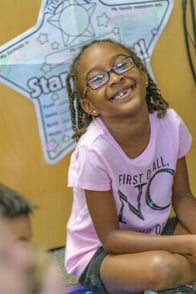 What if you had to choose whether your child would learn to understand algebra or be a kind person, but not both? Fortunately, we don’t have to make those kinds of decisions because good schools teach both academic skills and interpersonal skills. Most parents have an understanding of the academic concepts taught at schools and can find more specifics in a curriculum guide or a set of grade-level standards. But, where do you look to find out what schools are doing to help kids grow up to be kind and responsible adults? How do you get a sense of how kids treat each other at a particular school?
What if you had to choose whether your child would learn to understand algebra or be a kind person, but not both? Fortunately, we don’t have to make those kinds of decisions because good schools teach both academic skills and interpersonal skills. Most parents have an understanding of the academic concepts taught at schools and can find more specifics in a curriculum guide or a set of grade-level standards. But, where do you look to find out what schools are doing to help kids grow up to be kind and responsible adults? How do you get a sense of how kids treat each other at a particular school?
The answers to those questions are not found in a guidebook (or in a blog, for that matter!), but in the everyday interactions of teachers and students. It starts with the kind of environment that schools create and the expectations that they set forth. At Sanford, our lockers don’t lock. We expect respect for people and property, and we create an environment where students trust each other. Tolerance, respect and compassion are at the heart of character education. If students care about one another, they treat each other in kind.
Student/teacher relationships at schools are key. Look for schools where students feel valued by trusted adults who, like their parents, want what's best for them and care about them. When a teachable moment presents itself, teachers need to be flexible and change gears. They need to focus on what is interfering with academic learning in that moment and thus teach character education. Recently, in one of our second-grade classrooms, a teacher recognized discord among a group of children, changed gears and grabbed a ball of yarn. She asked the second-grade students to gather in a circle. When the ball of yarn landed in their lap, each child was asked to share a positive statement about a classmate. Character education happens in the moment, and Sanford teachers capture those moments well.
Good schools offer activities and experiences that promote character development. Some examples of character education tools found at Sanford School include:
- Developing honor codes that are developmentally appropriate for preschool-Grade 12 students
- Teaching six pillars of character: respect, responsibility, fairness, caring, trustworthiness, & citizenship
- Finding teachable moments
- Integrating themes into the curriculum for the school year, such as kindness and honesty
- Modeling behavior for students throughout the school day
- Valuing integrity in the classroom and sportsmanship on the athletic field
- Incorporating community service opportunities for all members of the school community
Life skills constantly evolve, so teachers must integrate character education into the whole school experience. It is this approach that creates a caring community, one where kids learn more than just algebra.
Sarah Satinsky is the Upper School Counselor at Sanford School. To learn more about our counseling program, go to Sanford School's School Counseling page.
Suzanne Humphreys and Kelley Seravalli are former counselors at Sanford.









